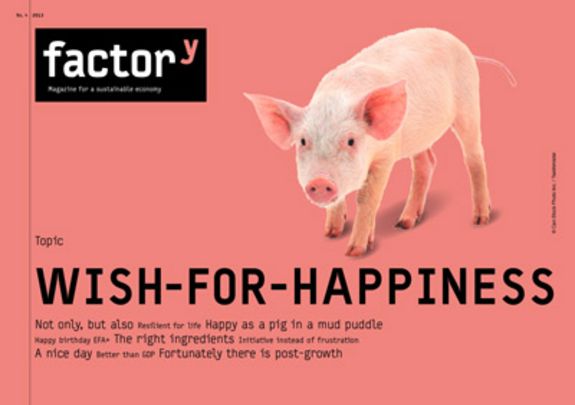Wish-for-Happiness

According to traditional business economics, many companies should not even exist. However, a completely different way of economical success could develop, in contrast to the theory, if happiness played the lead instead of money.
By Annette Jensen
Translated from the German by Chantal Gruber, Yvette Gossel and Ruthild Garner
One weekend, a couple of village dwellers near Munich decided not to be at the mercy of the food industry any longer. They were tired of buying their eggs from agonised chickens and eating vegetables that were grown in a field hundreds of kilometres away. They cannot be bothered to protest or hope for political decisions. Therefore, they took matters into their own hands. Since these people had understood that small farms have only a small chance of survival in the system, they organised a market stall for an organic farmer and worked there themselves. In the beginning, they didn’t even have a scale and therefore a paediatrician had to help them out with hers.
The project was fun for all of the participants. The network grew and gradually developed into a cooperative called Tagwerk (day work). Today, besides the numerous consumers, about one hundred growers such as farmers, beekeepers, butchers, millers and cheese makers are involved. The cooperative generates roughly EUR 5m per year, employs 39 people and is an important economic factor.
"Cooperation makes people happy ..."
The organisation claims that cooperation makes people happy. Today, the promotion of regional food products is not the only aim of the Tagwerk companion. The cooperative’s longtime chairman Inge Asendorf explains that she abandoned her academic career to work for Tagwerk due to the funny and interesting people. New projects are being developing continuously. For example, one companion writes funny seasonal recipe books, and the former bank manager Rudolf Oberpriller organised bicycle trips to farms and invented an ecological bicycle path throughout Germany. He says that his former work was useless and that the companions of the network do not need a lot of money to set up something meaningful. Rudolf Oberpriller’s statement confirms the results of the international happiness research, which Kate Pickett and Richard Wilkinson have summarised on the basis of worldwide research. They say that cooperation makes people happy ? whereas earning more money only supports well-being in very poor social classes and rising inequality does not even make rich people happy.
Even the founding of the Elektrizitätswerke Schönau (EWS; Schönau electricity plant), which today is a nationwide provider of green electricity, had not been planned. Chief executive Ursula Sladeck says that the participants in fact just slipped into the project. Everything began in 1986, after the nuclear accident in Chernobyl. Some neighbours wanted to take the first steps towards the grassroots phasing out of nuclear power by organising energy efficiency competitions. Then however, the venture developed its own dynamics, which were expedited by a stubborn energy provider who threatened to take the energy savers to court for harming the interests of his company. In subsequent years, the rebels of the Schönau electricity plant experienced a lot of solidarity. Was it ‘luck’ that experts had always appeared at just the right moments to help them out?
However, this issue then started to develop a momentum of its own and was driven by a stubborn energy supplier that threatened to take those people to court who had tried to reduce their energy consumption, for harming his business. In the following years, the ‘nuclear power rebels’ from Schönau received a lot of support. Were they just lucky to have always found experts at the right time to help them? Engineers, management and tax consultants, municipal representatives and publicity experts voluntarily offered their specialised knowledge, often even free of charge. They were fascinated by the project and knew that it depended on their support. They did not earn any money, but they got the great feeling of having successfully contributed to establishing an extraordinary company. Together they were able to compete with their powerful and financially better-off opponents and therefore helped David to win the battle against Goliath. The growth-critical economist Tim Jackson states that successful relationships are the key to happiness – and that “trust, safety and the sense of community decisively contribute to social well-being”. Even the people who only receive their energy from the ‘nuclear power rebels’ from Schönau can consider themselves part of this success story.
“Successful relationships are the key to happiness.”

And in fact, there are more happy entrepreneurial personalities. The chemist Hermann Fischer is a good example, because in his Auro chemical plant, located in Braunschweig, only organic and other natural substances are used to produce varnish, glue and cleaning agents. Fischer`s concept is thus exceptional in that sector – today approximately 90 per cent of chemical substances are based on petroleum and other fossil resources. But the 60-year-old chemist is firmly convinced that his ‘solar chemicals’ will prevail in the long run, as not only the most important resource of the conventional chemical industry is finite, but their production also only works by using many highly toxic substances like chlorine and nitric acid. Within the various steps of the synthesis process, apart from the desired products, high amounts of waste are also produced whose dangerous impact, however, is being ignored. By comparison, all of the products of the Auro company are biodegradable. As a student, Hermann Fischer already knew that he would never want to work for the pharmaceutical giants Bayer or BASF. Therefore, together with two fellow students, he founded his first company. He concludes his credo by saying that they did not only want to think about the right thing, but also act the right way. Happiness researchers believe that living and putting convictions into effect makes people content, as you can see in the case of the chemist Hermann Fischer. In contrary, the Happy Planet Index shows that environmental destruction has an extremely negative impact on one's well-being.
Another example is 35-year-old Sina Trinkwalder. She earned a lot of money in advertising – but after a while her job started to bore her and she felt the need of doing something more meaningful. Therefore she decided to found a company that offers elderly women and single mothers secure jobs. In her hometown of Augsburg, many people worked in the textile industry in former times until German employees were regarded as too expensive and production was moved to Eastern Europe and Asia. Sina Trinkwalder was convinced that some of these workers still had to be living in Augsburg.
“Living one’s own convictions makes a person content”.
Even though she had no clue about the textile industry, she was not worried – as she knew that she was capable of picking things up quickly. But more importantly, she is a person who can get others going and fill them with enthusiasm. Thus, her first sewing machine supplier taught her to sew, employees at museums informed her about the characteristics of the fabrics and when in the end she ran out of money to buy a sewing machine, a generous supplier even gave her a high discount. Today 130 women and men have unlimited jobs at Manomama. They sew bags for the DM drugstore chain and jeans for the Real hypermarkets, only working with organic fabric and earning more than 10 euros per hour.
There are several reasons for the success of her concept, which many economists had declared impossible to become successful. Sina Trinkwalder makes her pricing public – and it becomes apparent that she personally has very modest earnings and does not spend money on advertising. The marketing for her company consists in her appearing on talk shows defending her ideas against politicians and typical CEOs of global companies. At the same time she turns around the relationship between suppliers and customers. She calculates the price and makes it clear to her customers that she will neither lower the price of the fabric producers nor make her employees work extra hours or lower their salary.
And, lo and behold, it actually works. People buy her products. Sina Trinkwalder just had her book published in Germany: ‘Wunder muss man selber machen’(you have to create your own miracles),. Not only is the book fun to read but it also gives readers courage and even brings some happiness.
Annette Jensen is a German journalist and has been writing about economic alternatives to the mainstream for many years now. Her book ‘Wir steigern das Bruttosozialglück. Von Menschen, die anders wirtschaften und besser leben’ (We are increasing gross national happiness. About people who do business differently and live better lives) was published by the German publishing house Verlag Herder.
More articles to the topics of happiness, wishes and the good life you will find either online or in our magazine Wish-to-Happiness. Finly illustrated and lightly readable on tablet-computers and screens the PDF-magazine contains all articles and pictures as well as additional numbers and quotatians.
Beiträge online
WISH-FOR-HAPPINESS

- Not only, but also
- Resilient for Life
- The right ingredients
- Initiative instead of frustration
- A nice day
- Zum Glück gibt es das Postwachstum
- Besser als BIP
Themen
- The Domino Effect: the Mobility Transition as an Engine for the ‘Great Transformation’
- Cities Use the Space
- Decarbonization by 2030
- The fear of biting the hand that feeds you
- Where investing is a pleasure
- Why divestment is going to change the world
- A Robin Hood tax for climate protection
- May the Force Be with Us
- Modern Strategies
- The prerogative of interpreting the future now lies with the companies involved in climate protection”
- From Negotiating to Trading Equitably
- Can a donkey be tragic?
- Rethink rather than rebound: a sufficiency revolution must precede the efficiency revolution
- On Rebound, Prebound and Performance Gaps
- So Let Us Seize Power Then!
- With Common Property Against Political Failure
- So Let Us Seize Power Then!
- The Comforting Beauty of Failure
- “It Is Not Impossible at All.“
- Resource-light shopping
- Men Have Not Stopped Giving the Advantage to Women – So Far
- Toothpaste for Princesses and Soup for Pirates
- It is about equality
- A nice day
- Initiative instead of frustration
- The right ingredients
- Resilient for Life
- Not only, but also
- Appreciation – more please!
- Worth more than money
- Learning to value the value of goods
- Worth and Values
- The Transformative Power of Science
- Historically effective: How innovation and technology transform
- The Disappearance of Products
- Growing Older 101
- Columbus’ Egg
- It Works! In Theory at Least ...
- What If...?
- Analysing Separately – Thinking and Acting Together!
- Let’s Break Away from Determined Breaking Points
- More Gold in Waste than in Mines
- The art of separation
- Should you really DIY?
- The Aesthetics of Do-It-Yourself
- Standing on One’s Own Feet
- From the handaxe to desktop fabrication
- Using Shares to Survive the Crisis
- When Citizens participate
- Possess to Participate
- The Right Growth at the Right Time
- Gunter Pauli and Blue Economy
- When Sustainability Grows
- How we treat Growth
- Illusions about Growth

